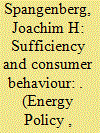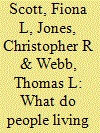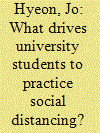| Srl | Item |
| 1 |
ID:
176762


|
|
|
|
|
| Summary/Abstract |
Government support for the ongoing use of fossil fuels has polarised public opinion in Australia regarding the country's transition to low carbon energy generation. Despite this, polls indicate a desire for more meaningful engagement in the global energy transition amongst the Australian populace, which has stimulated a growing interest in Community Owned Renewable Energy (CORE). This study used a questionnaire based on the Theory of Planned Behaviour (TPB) to evaluate intention to invest in a CORE project that would be sited in Queensland, Australia. The analysis also sought to identify the considerations that would have the greatest association with this intention. 67% of respondents indicated an inclination to invest in the project and the mean intention score was 5.0 out of a possible maximum of 7 in favour of investing. This mean was relatively stable across almost all demographic sub-categories for gender, age, employment and income. Beliefs related to the community benefits that the initiative would provide were the most reliable attitudinal predictor of intention to invest. The findings concur with other studies that indicate widespread support for renewables amongst Australians and which suggest that “not in my back yard” (NIMBY) concerns are not a significant influence on negative attitudes towards renewable energy in Australia.
|
|
|
|
|
|
|
|
|
|
|
|
|
|
|
|
| 2 |
ID:
166578


|
|
|
|
|
| Summary/Abstract |
It is increasingly obvious that for safeguarding environmental sustainability, eco-efficiency measures will need to be complemented by sufficiency, in particular by strong sustainable consumption. The Theory of Planned Behaviour TPB and Social Practice Theory SPT offer different views on consumer behaviour, and on ways to change it. This paper briefly describes the challenges, discusses the applicability of both theories and their meaningfulness for policy recommendations.
|
|
|
|
|
|
|
|
|
|
|
|
|
|
|
|
| 3 |
ID:
127914


|
|
|
|
|
| Publication |
2014.
|
| Summary/Abstract |
While physical interventions such as external wall cladding can improve the energy efficiency of domestic properties, how residents think about and respond to such interventions can influence both their uptake and impact on the household's energy use. The present research investigated what residents living within deprived communities in Yorkshire and the Humber (United Kingdom) thought about a number of household energy efficiency interventions proposed as part of a project known as "The BIG Energy Upgrade". The Theory of Planned Behaviour was used as a framework for investigating residents' beliefs. Residents generally felt positive about the proposed interventions and expected that they would lead to financial savings, improve the appearance and warmth of their homes, and sense of pride in the local community. However, while residents intended to adopt energy efficiency interventions if offered them, they were less willing to personally invest in them. Home ownership and the belief in humans' ability to tackle climate change were found to predict willingness to invest. These findings help to understand responses to initiatives that seek to improve the energy efficiency of hard-to-treat homes.
|
|
|
|
|
|
|
|
|
|
|
|
|
|
|
|
| 4 |
ID:
191109


|
|
|
|
|
| Summary/Abstract |
As COVID-19 has caused unprecedented social change, governments are implementing several social measures to control transmission. Among them, social distancing is being enforced in almost all countries and is effective in preventing infection. Based on the importance of social distancing, this study identifies factors influencing the intention towards social distancing. The research model was developed by introducing risk perception in the theory of planned behaviour. To examine the proposed model, a survey was conducted with 339 university students from two countries, South Korea and Vietnam. The data were analysed using the partial least squares method. The results show that social distancing attitude and perceived behavioural control significantly influence social distancing intention. The findings indicate that both affective risk perception and cognitive risk perception serve as imperative factors in the formation of social distancing attitudes, subjective norms and perceived behavioural control. However, subjective norms and nationality do not affect social distancing intention. Based on the results, suggestions are made for policymakers to establish effective social measures.
|
|
|
|
|
|
|
|
|
|
|
|
|
|
|
|